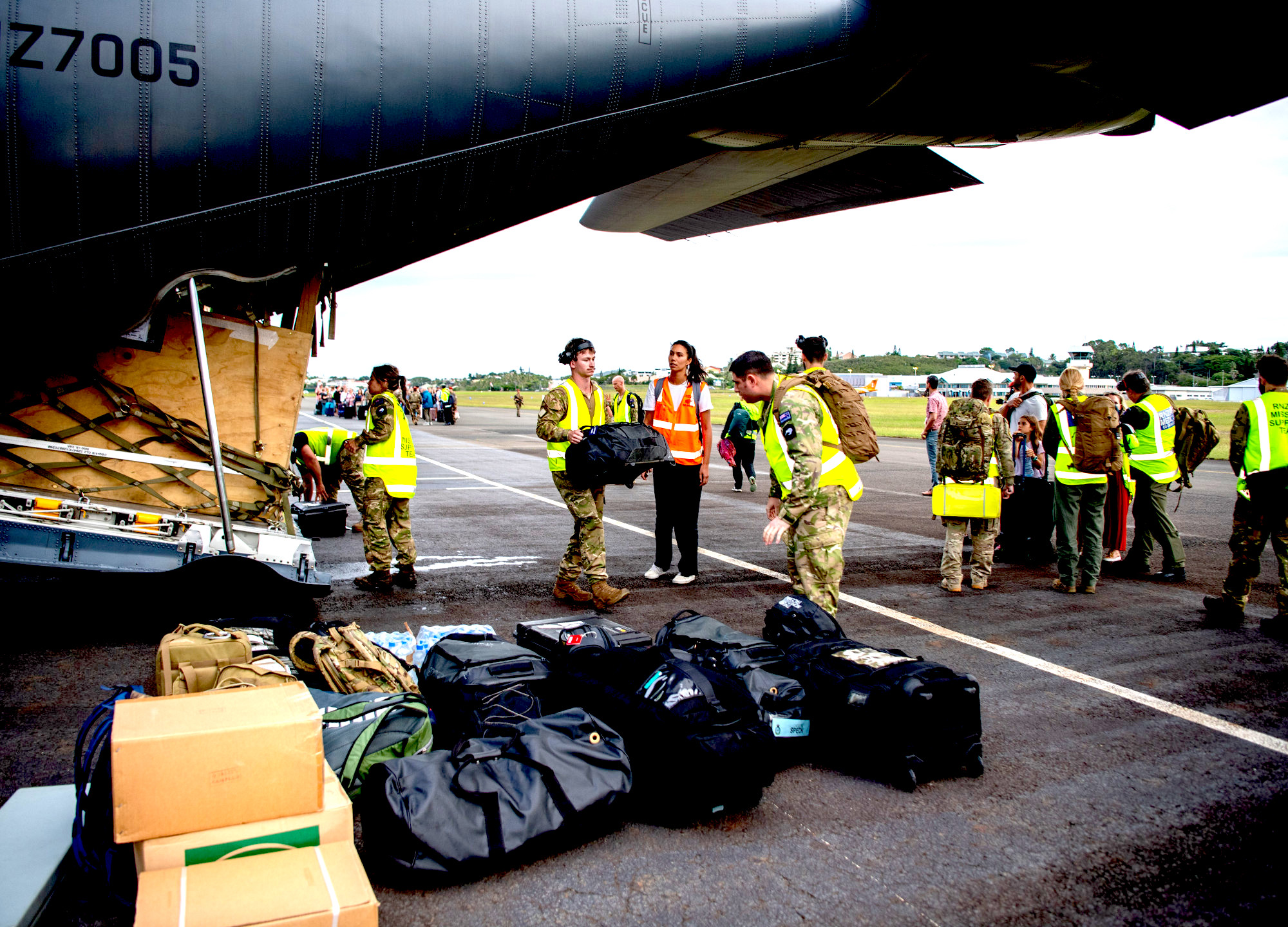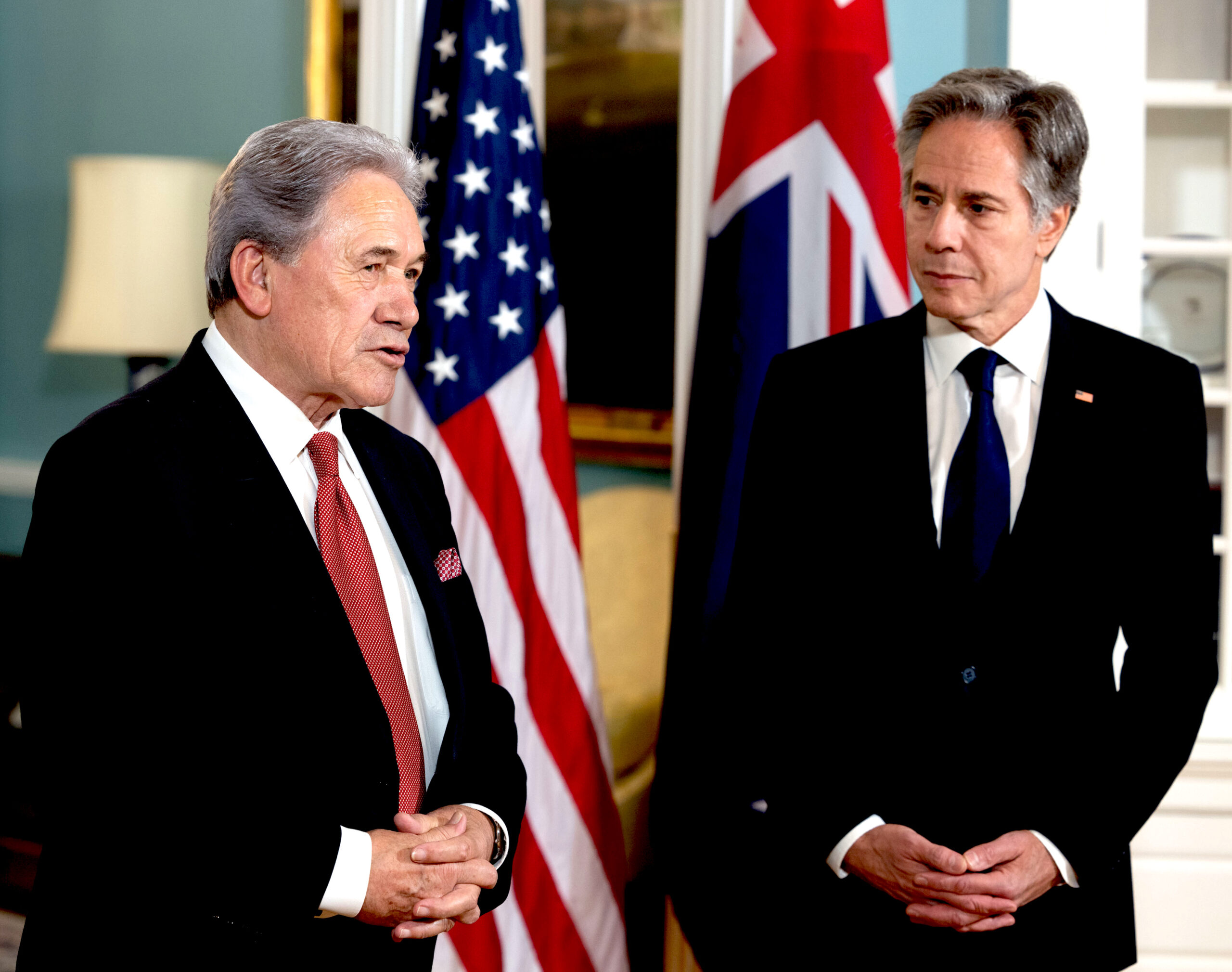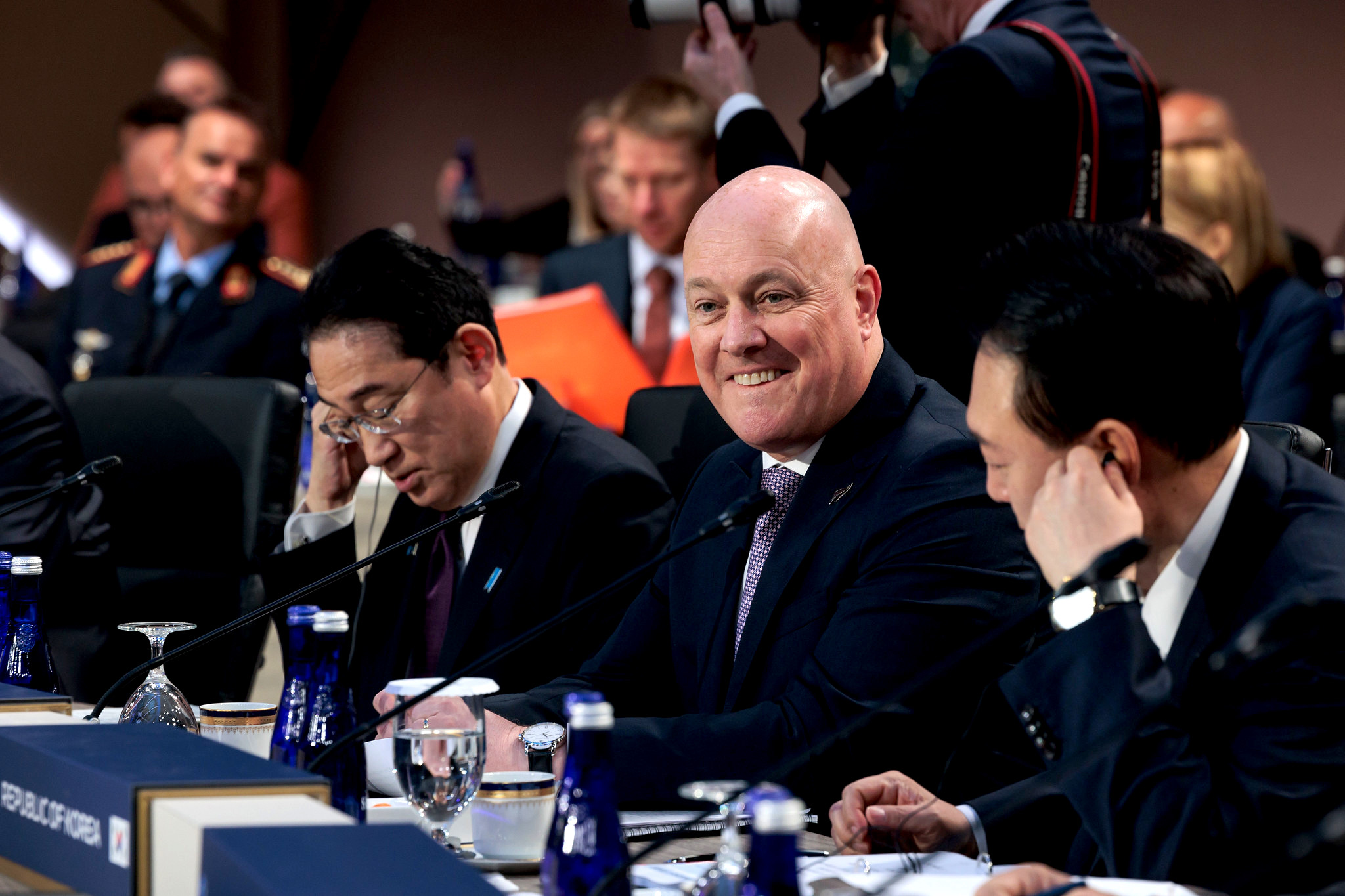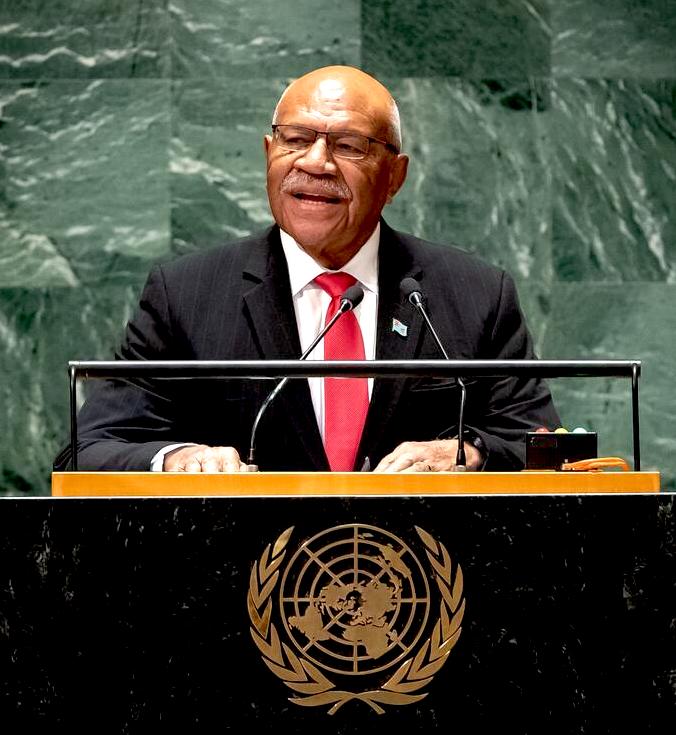Mick Hall reports on the Pacific Islands Forum taking place this week against a backdrop of simmering violence between French security forces and protesters in New Caledonia.

Royal New Zealand Air Force returning New Zealanders and approved foreign nationals from New Caledonia on May 22. (RNZAF / NZDF, Wikimedia Commons, CC BY 4.0)
By Mick Hall
Special to Consortium News
 The 53rd annual Pacific Islands Forum (PIF), which opened Monday in Tonga, takes place amid a backdrop of simmering violence and confrontations between French security forces and protesters in New Caledonia that has so far left a dozen dead, as well as increased geopolitical tensions between China and the U.S. with its regional allies.
The 53rd annual Pacific Islands Forum (PIF), which opened Monday in Tonga, takes place amid a backdrop of simmering violence and confrontations between French security forces and protesters in New Caledonia that has so far left a dozen dead, as well as increased geopolitical tensions between China and the U.S. with its regional allies.
On the agenda are talks on the impact of climate change. But for the West, the political thrust of the gathering is keeping Pacific nations outside of China’s orbit and enmeshed instead in Western military architecture.
The five-day meeting, which runs until Friday, is being attended by the 18 leaders of strategically important islands and archipelagos spread across the vast Pacific Ocean, as well as think-tank analysts and politicians from sub-imperial countries like Australia and New Zealand who are sounding the alarm over the supposed dangers of “malign” Chinese influence in the region.
China will be given a key focus at the forum, the region’s top political consensus body established to enhance trade cooperation, peacekeeping and a shared vision of good governance.
Some are openly arguing that colonialism in the region is instrumental in keeping China’s rise — within a multipolar context — contained.
Many Pacific nations have close trade and development ties with China and some, like the Solomon Islands, have signed security agreements.
New Zealand Hawkish on Beijing

Winston Peters with U.S. Secretary of State Antony Blinken in Washington in April. (State Department/Chuck Kennedy)
New Zealand Foreign Minister Winston Peters in particular will be keen to discourage its members from pursuing relationships with China, his own country’s biggest trading partner.
Peters told Associated Press on Friday that the U.S. and its allies, including New Zealand and Australia, had failed to engage enough in the region, leaving a power vacuum for others to fill, meaning China.
Prior to the summit he had visited 14 Pacific countries this year. New Zealand is increasingly exercising sub-imperial power in the region, trading on its anti-nuclear tradition and its constitutional guarantee of indigenous Maori rights so it can deceptively present itself as a honest broker to members of the ‘Pacific family’.
That image is unraveling fast with its increasing alignment with the U.S.-led military architecture in the region and the Australian defence posture, as articulated by Prime Minister Chris Luxon at a speech to the Lowy Institute in Australia this month.
Just as worrying is a New Zealand Defence Ministry briefing document obtained under the Official Information Act (OIA), which reveals New Zealand has been pushing for the PIF to be structurally linked to the Western-aligned South Pacific Defence Ministers’ Meeting (SPDMM).
The group last met in December in New Caledonia. It consists of defence ministers and senior civilian and military officials from Australia, Chile, Fiji, France, New Zealand, Papua New Guinea and Tonga, as well as observers from Japan, the U.K. and the U.S.

Luxon, between Japan’s Prime Minister Fumio Kishida, on left, and Korean President Suk Yeol Yoon, right, at the NATO summit in Washington on July 11. (NATO/Flickr, CC BY-NC-ND 2.0)
The SPDMM brings together regional defense ministers on military cooperation issues in the South Pacific and is broadly focused on maintaining U.S. hegemony, as well as pursuing military interoperability.
Last year’s SPDMM summit, hosted by France in New Caledonia, was attended by senior civilian and military officials from Australia, France, New Zealand, Papua New Guinea and Tonga, as well as observers from Japan, the U.K. and the U.S..
Briefing papers for NZ Defence Minister Judith Collins revealed her mission during a discussion with Tonga at the summit was to “convey New Zealand’s position that there should be a link between the SPDMM and the Pacific Islands Forum.”
The heavily redacted document noted that:
“The PIF architecture and defence architecture have separate but overlapping countries involved. This reflects that defence responsibilities in the region do not align with political representation… Linking the PIF architecture and the SPDMM is likely to enhance security discussion across both organisations.”
There is now concern that a parallel or overarching securitised regional architecture is being created. It remains unclear to what extent the issue will feature in discussions at the PIF summit this week.
Focus on New Caledonia
A definite focus will be put on French colony New Caledonia, where a dozen people have been killed in clashes between Kanaks and French security forces since May. Protests erupted after a vote in the French National Assembly on May 13 to pass a constitutional amendment to increase the number of French ex-pats eligible to vote in the island’s elections, hence diminishing decolonisation provisions of the Nouméa Accord.
The 1998 peace agreement promised independence for Kanaks if a majority voted for it via a referendum. French President Emmanuel Macron suspended the proposed law in June.
The Pacific Islands Forum leadership was scheduled to visit the archipelago on a fact-finding mission amid a crisis made worse after France arrested and deported independence figures to prisons in France as an increasingly militarized presence took hold. France now has thousands of troops and police stationed in the archipelago.
The Forum mission was postponed over what it said were “issues regarding due process and protocol that will need to be addressed.” Macron had said the mission needed to be within certain “guiding principles” of addressing issues like social and economic stability.
Fears have been expressed publicly about where New Caledonia would sit geopolitically if it gained its independence.
Anti-China scholar Anne-Marie Brady, writing for Western defense-aligned think tank the Australian Strategic Policy Institute (ASPI) this month, effectively argued for the merits of colonialism as a bulwark against Chinese influence.
Will New Caledonia govt turn to ?? to rebuild after the devastation of the riots? The risk is that ?? will switch from one form of dependency to another. In the interviews I conducted in my paper, New Caledonian leaders said they did not want that scenariohttps://t.co/PTEcB9Ukya
— Professor Anne-Marie Brady FRSNZ (@Anne_MarieBrady) August 23, 2024
She argued that if New Caledonia were to become independent without France’s continued financial and security support it would “weaken regional security in the Pacific.” She said the independence coalition Front de libération nationale kanak et socialiste (FLNKS) would align closer with China.
She said:
“French military assets are one of the factors standing in the way of China changing the power balance in the Indo-Pacific, and in the South Pacific more specifically. France and the U.S. are the only actors in the region with networks of military bases worldwide, and with global military communications networks based on sovereign territory.
“If France were to lose any of its Pacific territories, and access to the vast maritime area they provide, its global influence and status would decline significantly. That situation would suit the interests of China and Russia. France’s Pacific territories of New Caledonia and French Polynesia provide a major logistics base for NATO military assets and the European Space Agency.”
Brady added New Caledonia was now dependent on the Chinese market for its exports, which posed a “strategic risk.” She said: “The territory needs to rebalance its economy and return to a more diversified portfolio of markets.”
Former U.S. State Department security advisor and geopolitical analyst Van Jackson told Consortium News such Western interventionist attitudes were stopping the Pacific region from becoming a “zone of peace,” a phrase championed by Fiji’s Prime Minister Sitiveni Rabuka at last year’s PIF summit.
Imagine being so consumed by China derangement that it becomes a reason to defend colonialism pic.twitter.com/8kw6hBlAS1
— Van Jackson (@RealVanJackson) August 22, 2024
He argues Western talk of maintaining a “free and open Indo-Pacific” is rhetoric masking the true nature of relationships in the region. Jackson said:
“The existence of a non-sovereign Pacific — approximately a third of the region lacks sovereignty in some way — is actually the region’s primary source of insecurity. Outside powers want the Pacific to serve as a geopolitical buffer, but they think the only way to do that is by exercising exclusionary control themselves.
It’s that dynamic that’s leading to a carve-up of the Pacific. But if the Pacific were truly independent, cohesive, and self-determining then the region could credibly be a buffer that limits impositions by outside powers. Colonialism is what is currently standing in the way of great-power stability.”
Chinese Investment

Fiji’s Prime Minister Sitiveni Ligamamada Rabuka addressing the U.N. General Assembly in September 2023. (U.N. Photo/Laura Jarriel)
Western political messaging and news media narratives have cast China’s “increasing assertiveness” as a challenge to the “geostrategic balance” in the region that must be checked.
China has invested heavily in the Pacific, with its pragmatic global infrastructure development strategy, the Belt and Road Initiative, also extending into the region.
Australian thinktank the Lowy Institute released a report ahead of the summit pointing to the BRICS member becoming a major player in development aid, including ports, finance, airports and telecommunications and that it had sought a greater role in the military, policing, digital infrastructure and media.
It warned the 18 Pacific islands members faced challenges of compromised good governance and transparency amid “unbridled strategic rivalry” between the U.S., its Western allies and China for influence.
“Faced with this new ‘great game,’ Pacific countries have become diplomatic price-setters and are leveraging increased competition to maximise development benefits,” the report said.
China’s Pre-Forum Summit
China hosted leaders of the Solomon Islands, Vanuatu and Fiji ahead of the PIF summit. The visit of Fiji’s Rabuka, who met Chinese President Xi Jinping in Beijing last week, came after Google announced it would build a $US200 million data center in the country to support a new subsea cable.
Overshadowing aid assistance and investment is a battle over who has access to their strategic locations, with rival nations seeking to monitor and control naval movements across the Pacific Ocean.
Prime Minister Hon. @slrabuka met with the President of the Peoples Republic of China, His Excellency Xi Jinping at the Great Hall of the People in Beijing yesterday. The meeting between the two leaders further reaffirmed ????? commitment to elevate bilateral relations. pic.twitter.com/7LB6vukAZA
— Fiji Ministry of Foreign Affairs (@Fiji_MOFA) August 21, 2024
The Lowy Institute report pointed out even seemingly benign and altruistic offers to mobilize naval and air assets for disaster response involves securing rights to use ports, airstrips and maritime routes around Pacific Islands, so U.S. allies and China are keen to offer assistance.
Sentinel States for the West
The U.S. and its allies have long wanted to turn the region’s nations into sentinel states, joining the likes of Japan and the Philippines in encircling China with military assets as the increasingly belligerent hegemon seeks to contain a growing challenge to its imperial rules-based international order.
A New York Times story last week said that the U.S. has reorientated its classified nuclear deterrence strategy to focus on a threat from China, increasing tensions further.
Jimmy Naouna, a leading figure in the pro-independence alliance of political parties, Front de libération nationale kanak et socialiste (FLNKS), said decolonisation would make it much harder for great powers to use his country as a pawn in the great power game now underway.
“That’s why we in FLNKS are calling for our independence, so that we are able to manage our own affairs, both at national and international level,” he told Consortium News.
“Taking into account this Indo-Pacific strategy that France is pushing ahead with in the region, they are basically using New Caledonia and French territories as its forward posting in the region.
“We believe that when we are able to manage our affairs we will be able to also manage geopolitical competition in the region and be able to align ourselves according to our national interests.
“But the fact that we are not fully sovereign means we don’t have that capacity. It’s very important for us that we’re able to play a leading role in negotiations. We don’t want to be used by the players in this political game between the two major powers, China and the U.S.”
Central to New Caledonia gaining independence is securing and winning a fourth referendum, an outcome the French electoral “reforms” endanger.
Macron showed his partiality towards French loyalism in the country when he declared a third referendum in 2021 legitimate after independence groups boycotted the vote because it was being held in the middle of the Covid-19 pandemic. That vote delivered a mere 3.5 percent backing for independence, down drastically from a 46.7 percent pro-independence vote in 2020.
The PIF has acknowledged the referendum failed to meet U.N. principles, having had observers at that vote, although countries like Australia have not publicly stated it was illegitimate.
[#PIF mission to KNC ?? compromised by France neocolonial attitude]
"[The] French state decided to control alone [the] subject and object of the mission as well as its future conclusion," New Caledonia Congress President, Roch Wamytan, said in a statement on Sunday, sent to RNZ https://t.co/1njMwktgmX— Jimmy Naouna (@JNaouna) August 19, 2024
“I don’t think France will go back and say that that referendum was not legitimate,” Naouna said. “But what we’re going forward with now is a plan to negotiate a new referendum on self-determination that will overcome this issue of a defective referendum.”
France’s apparent decision to restrict the PIF’s fact-finding mission to New Caledonia, leading to its postponement, has in effect stifled the possibility of meaningful statements coming out of the leaders’ engagements at this week’s forum. Without being adequately briefed on the situation, a further planned high-profile visit of PIF leaders to the country to add impetus and direction to peace talks has been made difficult.
Instead, Western security architecture in the region is likely to have a significant bearing on any resolution of New Caledonia’s crisis of sovereignty, ultimately responsible for the current bout of instability and violence.
The next SPDMM summit is due to take place in November hosted by New Zealand, with New Caledonia also a key focus. With that military grouping set on maintaining the colonial dynamics of the region as a means of maintaining the geopolitical status quo, prospects for an immediate just settlement in the country may be low.
Mick Hall is an independent journalist based in New Zealand. He is a former digital journalist at Radio New Zealand (RNZ) and former Australian Associated Press (AAP) staffer, having also written investigative stories for various newspapers, including the New Zealand Herald.
Views expressed in this article may or may not reflect those of Consortium News.

One can judge a bird (Anne-Marie Brady) by its colours (ASPI).
Another great report from Mick Hall.
While I have respect for the people of New Zealand, her leaders are to be despised for submitting to US demands. Loss of sovereignty is a Canadian thing. Come on New Zealand, you will eventually realize the stupidity of your ways.
It should be completely obvious beyond colonialism that they including Japan have been abused and misused for nuclear testing and are even risking nuclear war in a NATO pivot to Asia. Plus the additional impact of western civilization regardless of environmental impacts on all of the planet for maximizing profits as well as permanent war for dominance and supremely wasteful of resources in superior lifestyles of rich and famous.
As one of the underregarded geostrategic pivots on Zbigniew Brzezinski’s “Grand Chessboard,” Azerbaijan has a known history of being a nexus for covert geopolitical intrigues in the post-Soviet era, typically coordinated by more powerful countries and alliances (such as the United States, NATO, Turkey, and Israel), as attested to by the activities of, e.g., Silk Way Airlines (comparable to those of Turkish Airlines in, e.g., Nigeria and West Africa – see Mustapha Bagudu, “We’re Investigating Alleged Turkish Support For Boko Haram – DHQ,” The Will (Nigeria), Nov. 26, 2019), and its use as a logistical base for transnational mujahideen insurgents after the 1993 regime change against Abulfaz Elchibey backed by “MEGA Oil” (a front for Air America and Iran-Contra alumni Richard Secord, Heinie Aderholt, and Ed Dearborn), as documented in the work of Thomas M. Goltz, Nafeez Ahmed, Sibel Edmonds, Dilyana Gaytandzhieva, Devansh Mehta, Barak Ravid, etc. It would not be difficult for them to draw upon this preexisting experience to advance their own interests in certain contexts, such as instigating their own variations of “colour revolutions” (freelance or otherwise) against France in New Caledonia, Corsica, and elsewhere, which may dovetail with international competition over resources such as nickel (Sydney Black, “Nickel and Dimed: The Green Metal Gamble in New Caledonia,” Harvard International Review, May 22, 2024).
Pivotal importance of Azerbaijan increased from the time of Brzezinski. Supplier of oil and natural gas to Europe, potential base against Russia and Iran, potential ONLY transit route from Central Asia that avoids Russia, China and Iran that West put on the black list.
It seems that this is also a case of the West loosing a round because of a perennial problem: with a genuine old hostility, gaining influence in one party decreases the influence in the other. As the “color revolution” is Armenia kind of stabilized, Russia withdrew support and Armenia was clobbered. And now Azerbaijan featured in “Songs of Victory” YouTube, basically, May 9 propaganda video with a long collection of “golden oldies” performed by multiple artists from many cities, and apart from Russia, Belarus and Russian regions formerly in Ukraine, one can see Kazakhstan, Uzbekistan and Azerbaijan. You need to know Russian to get that point, but people in the region understand. More importantly, there was a series of energy agreements involving Russia, Kazakhstan, Uzbekistan, Azerbaijan and Iran that offer a kind of economic benefits that the West hates. This amity hints that cooperation of Azeris with Israel should decrease or vanish, there was hardly anything official to begin with, so it is invisible in the media, but again, something that Israel hates.
I would theorize that this example bolsters neutrality advocates currently democratically ruling in Georgia and having key election this Autumn.
” 18 leaders of strategically important islands and archipelagos spread across the vast Pacific Ocean”
It is worthwhile to deconstruct what “strategically important” means here. Tangibly, nothing. Tuvalu as a convenient launching pad for the invasion of Kiribati, or vice versa? With tiny areas and populations, located in the middle of largest nowhere on Earth, with hardly any maritime routes with possible exception of New Zealand, there only value is intangible, the ability to adorn world maps with little flags indicating Western control. Several UN votes supporting Israel or not in UNGA, which is similarly worthless diplomatically, but again, “it would be a said day when a UNGA resolution condemning Israel has only two votes in opposition, Israel and USA”. “Ominously”, China courts at least one of the Israel supporting countries, Micronesia, and who knows, it can bribe Palau as well?
Taken together, strategic value of those island nations is smaller than that of Montenegro or Northern Macedonia which are essential the potentially threaten Serbia, Hungary and Slovakia with a blockade. And why the hell we want to do it?
Additionally, “loosing Pacific possession” would dent the remaining traces of French greatness, but no more that a sudden cancelation of submarine contract with Australia after a bit of arm twisting by USA.
Strategy or strategery is a favorite pastime of our elites, and nowhere it is as empty a concept as in South Pacific.
People around the world know the alliance of China, Russia and BRICS is the bulwark against colonialism.
Much to their “colonial” chagrin. Oh look, the peasants are revolting. We can’t have that.
Check that box. This opinion must be addressed. Lets hear it you punks.
Before I hear Sit, TFU ! AT 76 years of age I’m gonna die first so suck it up better cupp!
Nice job . M.M.